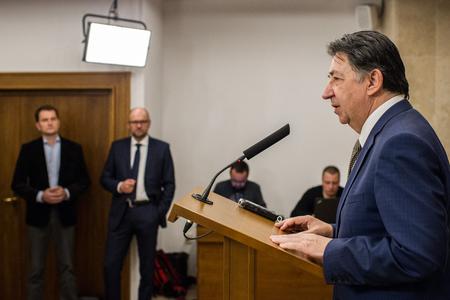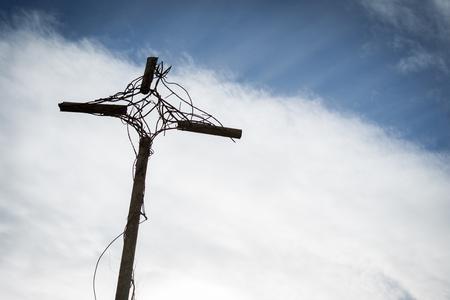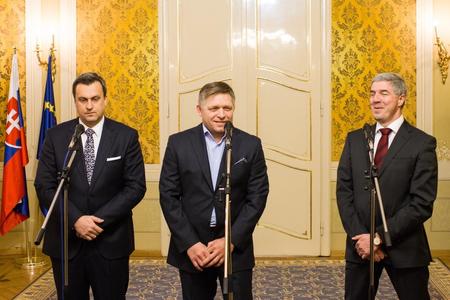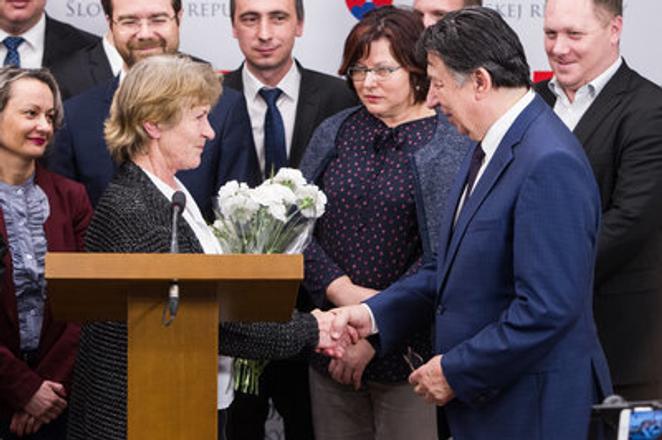It was not an ordinary vote in parliament on March 30. After a majority of parliament passed the constitutional amendment, Anna Remiášová came down from the balcony and gave a bouquet of white flowers to MP Ján Budaj (OĽaNO) who for years has been trying to abolish the controversial 1998 amnesties that are preventing the investigation of her son’s murder.
“It is well-known that I like flowers,” Remiášová told the press.
A year after Vladimír Mečiar, as acting president, issued amnesties for all acts related to the 1995 abduction of Michal Kováč Jr. the son of then-president Michal Kováč, Mečiar held a pre-election event in the town of Vrbové. At the end of the event he received congratulations and gifts from his voters as usual.
A woman approached him with a bouquet of white flowers and suddenly threw them at Mečiar. The prime minister, a former boxer, dodged them so the flowers hit his shoulder.
“I brought flowers to him and said that I wanted to look in the eyes of the person who ordered the murder of my son,” Remiášová then said.
The flowers were from the grave of her son Robert who burned to death when his car exploded in April 1996. Until his death Robert Remiáš served as a contact for a key witness of the abduction of the president’s son and then-Slovak Intelligence Service (SIS) member Oskar Fegyveres.
Due to Mečiar’s amnesties, among other things, the investigation into the abduction and Remiáš’ death has been halted.

Shifting of powers
The constitutional amendment will grant the powers to parliament to revoke presidential pardons and amnesties if they are in discrepancy with the principles of the democratic rule of law. MPs approved a coalition-sponsored amendment with 124 of 150 votes.
Under the amendment to the constitution, any revocation of amnesties or pardons must be evaluated within 60 days by the Constitutional Court (CC), which will be tasked with either confirming or rejecting the parliamentary decision. If the court fails to reach a verdict within the set deadline, the parliament’s decision will stand.
Furthermore, parliament decided via an amending proposal by the opposition that actions which are subject to amnesties will not fall under the statute of limitations.
“It’s the first round that I evaluate positively,” Remiášová told the Sme daily. “I believe that this will end the dirty past which Mečiar affected all of Slovakia with.”
The amendment is slated to be forwarded to President Andrej Kiska, who has 15 days to sign it into law or exercise a veto.
“We are waiting for his signature,” Béla Bugár, head of the coalition party Most-Híd told the press. “We hope that it will be as soon as possible because publishing [of the amendment] in the collection of laws takes at least a day.”

Constitutional Court
Once it’s published in the collection of laws, at least 30 lawmakers must submit a motion to annul Mečiar’s amnesties, which must be passed with at least 90 votes. Then the CC will have 60 days to approve or reject the motion.
Opposition parties proposed scrapping the amnesties without the CC deciding over it. They pointed out that several of the CC members are nominees of the Movement for a Democratic Slovakia (HZDS) led by Mečiar, which raises questions about how the court will decide.
“We understand that PM Robert Fico and his group passed a hot potato to the Constitutional Court,” Remiášová told the Sme. “Out of fear of Mečiar they escaped liability and involved CC judges.”
The verdict of the court will likely be known in June. If the CC approves the annulment of Mečiar’s amnesties, the decisions of investigators, prosecutors and judges halting the kidnapping investigation will be automatically cancelled.
The police will have to reopen the investigation of the case and Bratislava’s district court will have to take the lawsuit against then-SIS head Ivan Lexa and the other 12 suspects out of the safe and re-launch preliminary talks.
During the preliminary talks the court will decide whether it will accept the lawsuit and set the date of the main court hearing, or return the case to the prosecutor's office.

Will someone be punished?
Perpetrators involved in the abduction could get from five to 12 years behind bars. Current legislation is even stricter and those convicted of abduction could get 15-25 years in prison, or a life sentence.
Though scrapping the amnesties should reopen the investigation, many people involved in the case do not believe that anyone will end up in jail for what happened about 20 years ago.
“I can’t imagine that because they will not find anyone guilty after all these years,” prosecutor Michal Serbin who accused Lexa and the other twelve suspects back in 2000 told Sme. “I was satisfied with having Lexa in jail for nine months and showing this nation who this person is.”
Some of the offenders identified by Serbin are also known from other cases and have stood trial several times. For example, ex-SIS member Luboš Kosík is now in prison in Mali where he was in hiding.
Another ex-SIS member, Michal Hrbáček is accused of forming a criminal group that was taking houses from people. The case is still ongoing.
Nevertheless, Serbin considers abolishing the amnesties as an inevitable act because they are immoral.
Ex-SIS member Fegyveres, who now works at a pizzeria in the Czech Republic, agrees that the punishment of the people involved is not the most important thing now.
“Scrapping the amnesties should lead to revealing the truth in court,” Fegyveres told Sme.


 Anna Remiášová and opposition MP Ján Budaj (source: Sme)
Anna Remiášová and opposition MP Ján Budaj (source: Sme)